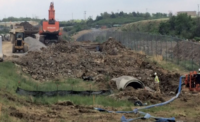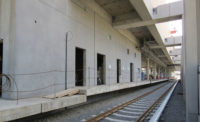Whistle-Blower Suit Triggers Multiple Probes of DC Metro Work

New investigations are planned over allegations related to out-of-specification panels fabricated for commuter rail stations in the Washington, D.C., area.
PHOTO COURTESY OF DULLES CORRIDOR METRORAIL PROJECT
A recently unsealed whistle-blower lawsuit has helped trigger new investigations of 1,569 architectural concrete panels installed at five stations on the $2.7-billion second phase of the Dulles Corridor Metrorail Project in northern Virginia. The transportation agencies involved called for additional tests to be performed after the U.S. Dept. of Justice and the Virginia attorney general’s office joined the whistle-blower lawsuit. It alleges that the panel fabricator knowingly supplied deficient concrete to the project and falsified test results.
In 2016, former Universal Concrete Product employee Nathan Davidheiser filed a whistle-blower lawsuit that was investigated by the FBI’s Washington Field Office and the U.S. Dept. of Transportation’s Office of Inspector General. The lawsuit was sealed until May 16, when the Dept. of Justice and Commonwealth of Virginia filed a combined notice of intervention against UCP.
Davidheiser’s March 29, 2016, complaint alleges that UCP employees, under their supervisors’ direction, falsified test results of concrete batches used on Dulles Metro panels that did not meet contract specifications. The complaint also alleges that the supplier used aggregate from an “unapproved quarry,” rather than the one specified in UCP’s contract with Dulles Metro project-contractor Capital Rail Constructors, a partnership of Clark Construction Group and Kiewit Infrastructure South. The complaint claims aggregate from that quarry did not pass alkali-silica reaction tests.
Don Faust, president of Universal Concrete Products, did not respond to calls for comment.
Water, Air and Steel Issues
The new allegations join a list of issues raised about products supplied by UCP to the Dulles Metro project. Tests conducted last year revealed that water content and air content in some panels were off-spec. Tests also revealed that placement of steel reinforcement in 60 of the panels was too close to the surface.
In light of the new investigation, Metro Chief Executive Paul Wiedefeld ordered an independent contractor to assess the condition of the concrete panels and to identify remedies. “Let me be clear: Metro is committed to ensuring that any remedies are paid for by those responsible, and that taxpayers and Metro customers are protected,” Wiedefeld said in a statement.
Charles Stark, vice president of the Dulles Corridor Metrorail Project, says that the Metropolitan Washington Airports Authority has ordered its own new probes focused on the potential alkali-silica reaction issue. MWAA was unaware of the aggregate problem until the lawsuit was unsealed, says Stark. “It took us by surprise,” he says.
Keith Couch, project director with Capital Rail Constructors, says that CRC also did not know the scope and details outlined in the claim until it was unsealed. CRC is conducting its own investigation. “It is premature for us to comment on the allegations against Universal,” he says.
A CRC quality control inspector discovered in April 2017 that an automated probe at the UCP plant was incorrectly reading the aggregate’s moisture content. Additional testing uncovered air entrainment problems in several panels.
The government lawsuit alleges that issues with air entrainment were known and covered up by UCP. The lawsuit claims that the contract requirement for air content was between 4.5% and 7%. Davidheiser provided copies of test results showing air content as low as 2.9%.
Davidheiser alleges that on multiple occasions, UCP supervisors instructed him and another employee to falsify test results. The lawsuit includes a text message allegedly from Davidheiser’s supervisor directing him to “change the data” before submitting it to the Dulles Metro project.
Before the latest problem emerged, CRC had committed to applying a silane coating with corrosion inhibitor to all of the installed panels and setting aside funds to pay for the coating to be reapplied every 10 years of the panels’ 100-year life expectancy.
Stark says the silane coating may be enough to mitigate possible alkali-silica reaction issues, but independent tests will be needed to confirm that.


